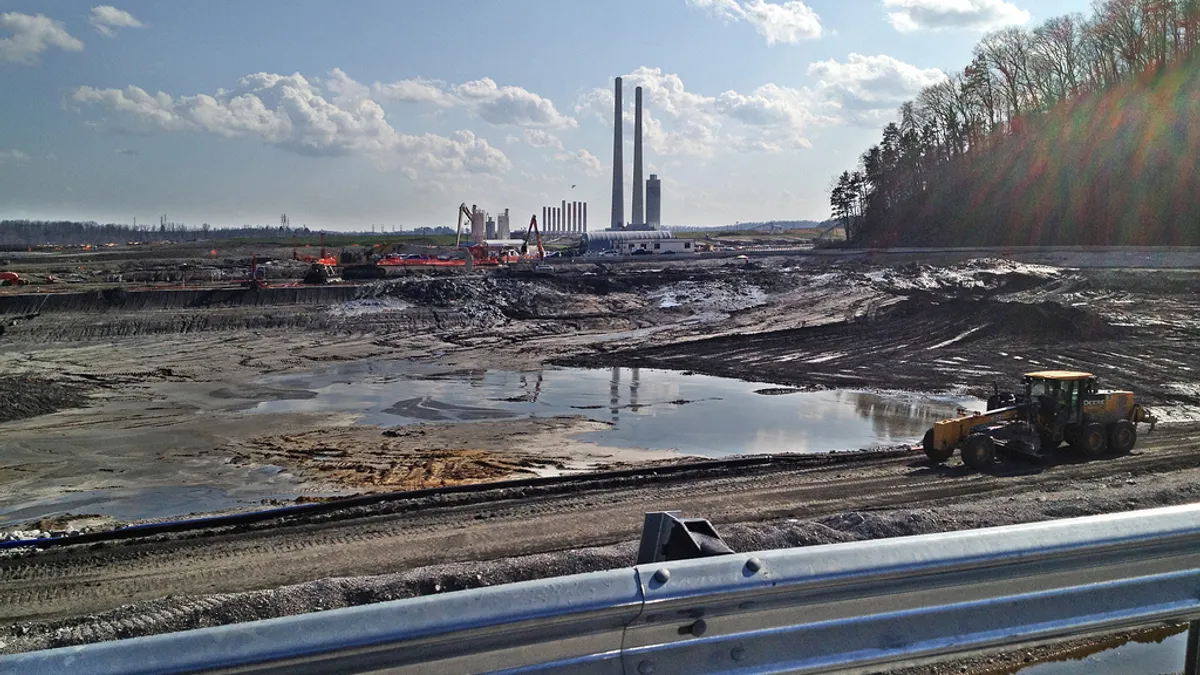Updated June 8, 2019: This post has been updated to reflect the EPA's comments.
Dive Brief:
-
The U.S. Environmental Protection Agency (EPA) on Tuesday eliminated the proposed Obama-era provision that would require utilities to set aside money for coal ash liabilities.
-
The rollback is one of five changes the EPA is planning to release this summer, part of the Trump administration's broader attempt to weaken federal oversight and give industry and states more leeway.
-
Environmentalists say the requirement to have financial assurances would ensure there's enough money to clean up coal ash sites in violation of federal rules and provides an incentive for utilities to manage the toxins more safely by lowering liability risks.
Dive Insight:
After the 2008 Tennessee Valley Authority coal ash spill, Obama's EPA determined that the potential cost of a coal ash clean up was large enough that utilities should be required to set aside money as a shield against that liability. Now, the agency has determined those funds are not necessary.
"By proposing no new financial requirements, we will be ensuring that no duplicative or unnecessary burdens fall on America's energy producers," said EPA Administrator Andrew Wheeler in a press release.
The EPA is in the midst of five rulemaking efforts surrounding financial assurances for the mining and petrochemical industries and is separately expected to roll out the second phase of its coal combustion residual (CCR) rule changes this summer.
A year ago, the EPA in its first phase of the rollbacks extended some site closure timelines from April 2019 to October 2022. And last month, the EPA recommended Georgia become the second state to operate its own coal ash permitting.
Environmentalists fear these rollbacks give industry less oversight over managing the toxic waste, especially as a recent Earthjustice report based on utility groundwater filings found that almost every coal ash site in the country has unsafe levels of one or more toxins. And in August of last year, a D.C. Circuit Court of Appeals revealed that the Obama-era regulations weren't stringent enough in protecting public health.
At the same time, several states have also determined that federal rules don't go far enough. Virginia and North Carolina have ordered Dominion Energy and Duke Energy, respectively, to completely excavate all their coal ash ponds, and Illinois recently passed legislation that would increase state oversight on the plants. But environmental groups say the problem is still widespread.
"We have lost ponds since 2008, but there are over 200 significant and high hazard coal ash dams, so the risk has not diminished appreciably," Senior Earthjustice Attorney Lisa Evans told Utility Dive. "In addition, even though some of those coal ash ponds may have closed in the intervening years, we now have data available to show the widespread contamination that has occurred to groundwater from the coal ash disposal … So this is an awful lot of liability that EPA is now ignoring."
The EPA said lack of bankruptcies in the utility sector, as well as utilities' ability to emerge from them largely unharmed, is part of its confidence in not implementing the proposed assurances and says current industry practices as well as federal and state regulations "address risks from operating electric power facilities."
"Further evidence suggests that, due in part to factors such as the significant amount of fixed infrastructure and consumer dependence on electricity, energy sector firms that default tend to emerge from bankruptcy and continue to operate rather than fully close," an EPA spokesperson told Utility Dive in an email.















